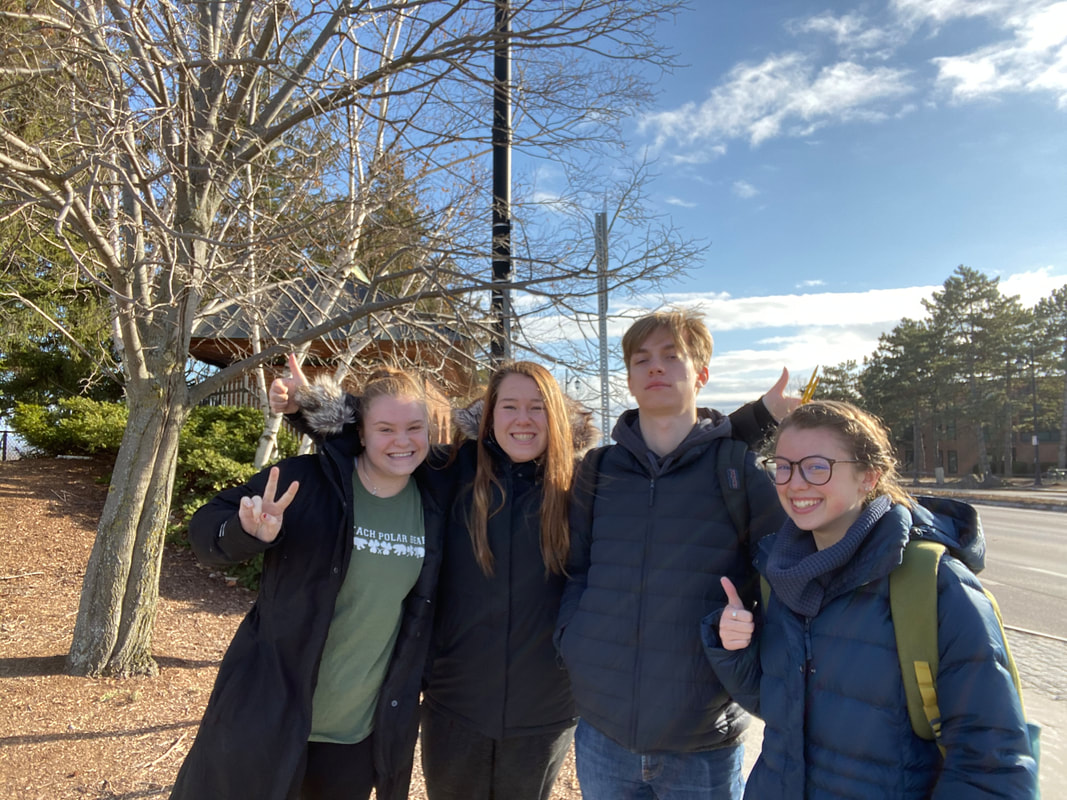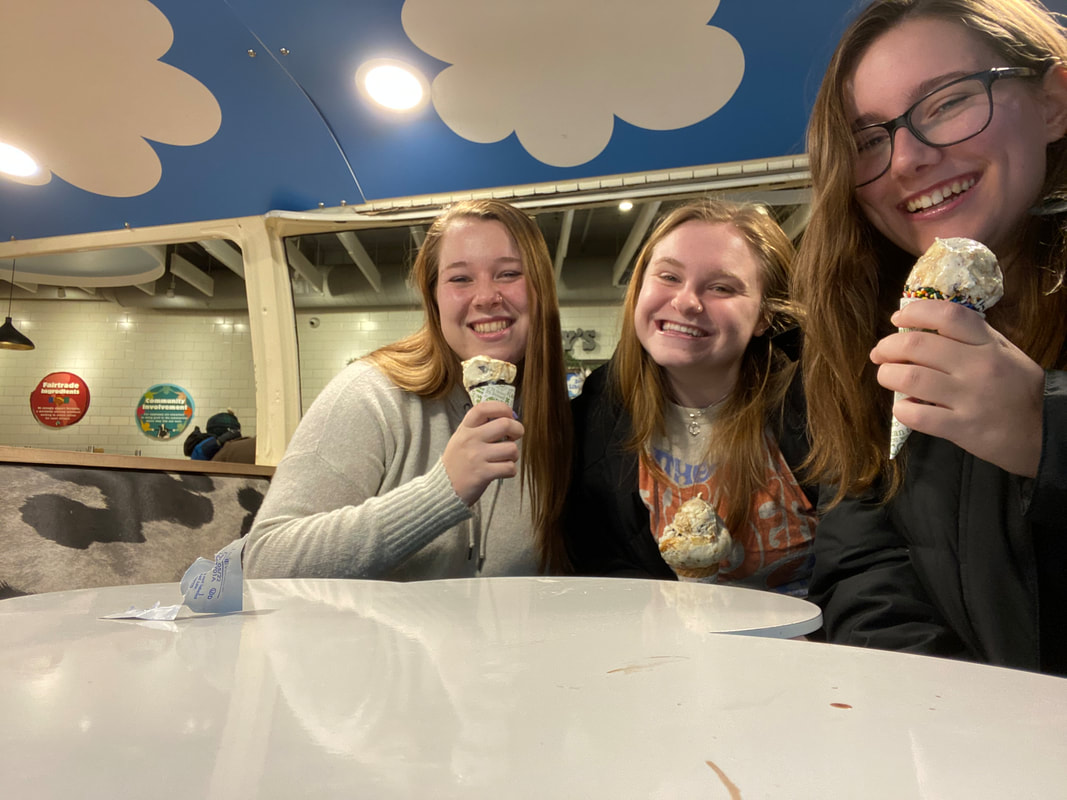 from left to right: Machara, Medwyn, Daniel, and Courtney
from left to right: Machara, Medwyn, Daniel, and Courtney Upon receiving my acceptance letter from UVM, I was offered the opportunity to apply for the LASP program. There were many different programs within LASP to apply to and I chose the Life Science Scholars (LSS). I was super excited because in depth and hands on learning was what I was hoping to get out of going to college, and this program offered me both. I met Dr. Laura May-Collado at admitted students’ day in the Davis Center to ask about the program. From our conversation I could tell that she was extremely passionate about her research and was eager to give me the opportunity to conduct my own.
One of my favorite things about the LASP program is that I was living with people who were in either LSS or one of the other groups. It was extremely helpful to live with people who had similar interest and majors. We worked on homework, labs and conducted research together throughout the year. The set up of our suites and the building we all lived in allowed us to become friends and form a community of hardworking, intelligent and kind people. Our interests and love for learning were similar, but each of us added to the diversity of the program.
In fall semester, the LSS class was called Nobel Prize Winners, with Dr. Bryan Ballif, an extremely intelligent professor and mentor. In this class, we learned about Nobel Laureates and their scientific processes. It was extremely compelling and allowed us to learn about the evolution of the scientific method and how research is conducted. My favorite part of this course was the project at the end of the semester, where each of us chose a specific Nobel Prize to focus on. The goal was to present on the Nobel Laureate and his/her research. My presentation focused on Georg Von Bekesy, and the mechanisms of the cochlea and inner ear processes. I found that having my classmates presenting material demonstrated our enthusiasm for learning and understanding.
After working on understanding the scientific method better, and presenting other scientists research, I was looking forward to spring semester and working with Professor May-Collado and conducting research of my own. This process was challenging but ended up paying off in the end. The experiments performed in labs are great, but they are designed for us and conducted quickly. The CURE program in LSS allowed me to work with friends to design, predict and conduct our experiment. Professor May-Collado says that science is not about “eureka moments”, but rather about the question being asked, the experimental design, and constantly adjusting and deep thinking. Our research looked at whistle variation among pantropical spotted dolphins in different geographical regions. We presented our process at the UVM student research conference. It was wonderful to see my classmates work and to ask questions.
Applying for the LSS program was the best decision I could have made coming into UVM. I have had the opportunity to work with two wonderful professors while not only learning in depth about the scientific method but getting to conduct my own research. This program is immersive and engaging, providing the best opportunities to learn and make friends. I would encourage students to take risks and pursue interests through this program. Even if it is not exactly what you want to do after college, it will teach you critical thinking, collaborative teamwork and all about the importance of the scientific method.
One of my favorite things about the LASP program is that I was living with people who were in either LSS or one of the other groups. It was extremely helpful to live with people who had similar interest and majors. We worked on homework, labs and conducted research together throughout the year. The set up of our suites and the building we all lived in allowed us to become friends and form a community of hardworking, intelligent and kind people. Our interests and love for learning were similar, but each of us added to the diversity of the program.
In fall semester, the LSS class was called Nobel Prize Winners, with Dr. Bryan Ballif, an extremely intelligent professor and mentor. In this class, we learned about Nobel Laureates and their scientific processes. It was extremely compelling and allowed us to learn about the evolution of the scientific method and how research is conducted. My favorite part of this course was the project at the end of the semester, where each of us chose a specific Nobel Prize to focus on. The goal was to present on the Nobel Laureate and his/her research. My presentation focused on Georg Von Bekesy, and the mechanisms of the cochlea and inner ear processes. I found that having my classmates presenting material demonstrated our enthusiasm for learning and understanding.
After working on understanding the scientific method better, and presenting other scientists research, I was looking forward to spring semester and working with Professor May-Collado and conducting research of my own. This process was challenging but ended up paying off in the end. The experiments performed in labs are great, but they are designed for us and conducted quickly. The CURE program in LSS allowed me to work with friends to design, predict and conduct our experiment. Professor May-Collado says that science is not about “eureka moments”, but rather about the question being asked, the experimental design, and constantly adjusting and deep thinking. Our research looked at whistle variation among pantropical spotted dolphins in different geographical regions. We presented our process at the UVM student research conference. It was wonderful to see my classmates work and to ask questions.
Applying for the LSS program was the best decision I could have made coming into UVM. I have had the opportunity to work with two wonderful professors while not only learning in depth about the scientific method but getting to conduct my own research. This program is immersive and engaging, providing the best opportunities to learn and make friends. I would encourage students to take risks and pursue interests through this program. Even if it is not exactly what you want to do after college, it will teach you critical thinking, collaborative teamwork and all about the importance of the scientific method.

 RSS Feed
RSS Feed
